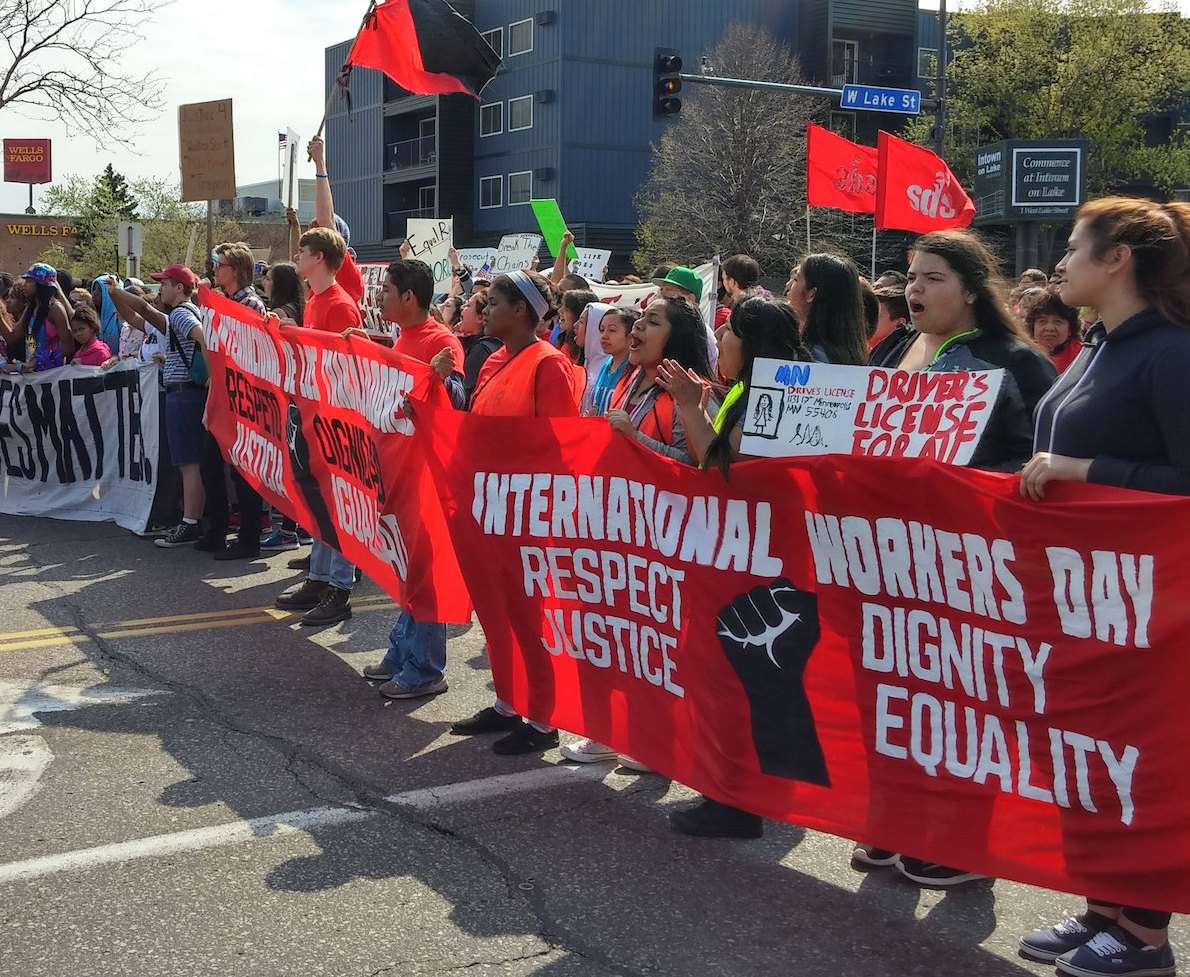Gathering initially in Paris on July 14, 1889 to mark the centenary of the French Revolution, the Second International voted at its Second Congress in 1891 to observe May 1 as International Workers’ Day.
The Second International was made up of socialist and communist parties, linked to trade unions and other workers’ organizations. While it dissolved after workers’ parties went to war against each other in 1914, the hopes it engendered live on.
The designation of May 1 was inspired by the American workers’ movement call in 1886 for a general strike that day in favour of the eight-hour working day. In Chicago, the Haymarket action ended with police shooting workers, a memory which inspired labour action for decades.
By 1904, the Second International was calling for all socialist or social democratic parties and trade unions to demonstrate support for peace, the working class, and the eight-hour day — by striking on May 1.
May 1 is now recognized as Labour Day in a majority of countries.
In France, where the eight-hour day was granted 100 years ago, as the Great War ended, May 1 has been a paid holiday since 1947, shortly after the end of the Second World War.
In 2019, the labour movement around the world prepares its demonstrations of hope, solidarity, and support for collective action at a time of major worker distress and unrest.
In Paris the main labour march organized by the trade union centrals will be led by les gilets jaunes, protesters who launched a tax revolt, and are now demanding a democratic revolution.
In the year 2000, the French Socialist government headed by Lionel Jospin legislated the 35-hour work week: it is still under attack by employer groups. Marchers are calling for a 32-hour week.
Around the world, evidence of climate change and destruction of nature adds to everyday concerns about worker health and safety; wages, retirement, and job security; childcare and family support; access to education, science, amateur sports, the arts and cultural life.
The inability of conventional social democratic parties to make headway against financialized capital or protect trade unions from job losses in a globalized economy has workers’ organizations confused and distressed about avenues for political action.
While workers have fought to expand citizenship to include social and economic rights, political parties, even those of the left, have become more apt to view citizens narrowly as voters/consumers, and themselves as marketing agencies.
Capitalism — the great engine of two centuries of economic advance and upheaval — is losing legitimacy with citizens all over the world as it becomes clear that the profit-seeking system mainly works for those reaping the proceeds of the work done by others.
In the rich countries, wages and salaries have been lagging behind productivity gains, while rentier incomes for the top 1% soar. In the poor countries, resource exploitation enriches foreign enterprises and despoils local societies.
The underpaid, alienated worker depicted by the young Karl Marx walks through urban centres looking in vain for a fair share of the comforts of life as part of the just-in-time, digital-economy precariat.
Decades of neoliberal austerity have depressed wages through the creation of a permanent army of the underemployed and unemployed, which works to the benefit of bottom-lines in the corporate sector.
Cutting government spending is the panacea to whichever of the three interchangeable bogeymen the corporate world has currently identified as the problem: inflation, budget deficits, or international competitiveness.
The propaganda mill of business-sponsored research furnishes bogus analysis of conditions facing regular people. When governments help companies move production abroad, workers are supposed to adjust by themselves. Unemployment is supposedly the fault of the individual. Good jobs go unfilled because workers have failed to get sufficient training.
The corporate media divides the world into the political left and right … and then disappears the left, denying many access to understanding their own world as workers.
In presenting economic, social and political news solely from the perspective of the investor, the mainstream media does itself a disservice, becoming another victim of the crisis of legitimacy, as readers abandon newspapers and TV newscasts.
The onset of authoritarian government in Brazil, Hungary, the United States, Ontario, or Alberta — and the arrival of a leader with a solution — has its counterpart in the receptivity of the public to authoritarian depictions of social reality as made up of “us” and “them,” friends and enemies, migrants and locals.
The purpose of May Day celebrations is to reforge the bonds among the peoples of the world, return to the internationalism of the Second International, and recognize the universal that joins the particular.
Toil and tears know no racial, religious or territorial boundaries. Men and women work together to meet each other’s needs, everywhere and at all times, formally or informally, equally or unequally, dominated or not by relations of exploitation.
May Day coincides with an ancient Celtic tradition of recognizing spring through gifts of flowers.
This May 1, on the streets of Paris and other French centres, people will buy sprigs of lily of the valley, free of tax, from unlicensed street vendors from Brittany.
Flowers will be worn and shared with loved ones.
In France, the worker’s holiday is thereby joined to a festival that signifies love for others. Is this not the world as it should be, and indeed has to be, if we expect to meet the pressing needs of our planet and its people?
Duncan Cameron is president emeritus of rabble.ca and writes a weekly column on politics and current affairs.
Photo: Fibonacci Blue/Flickr
Help make rabble sustainable. Please consider supporting our work with a monthly donation. Support rabble.ca today for as little as $1 per month!




